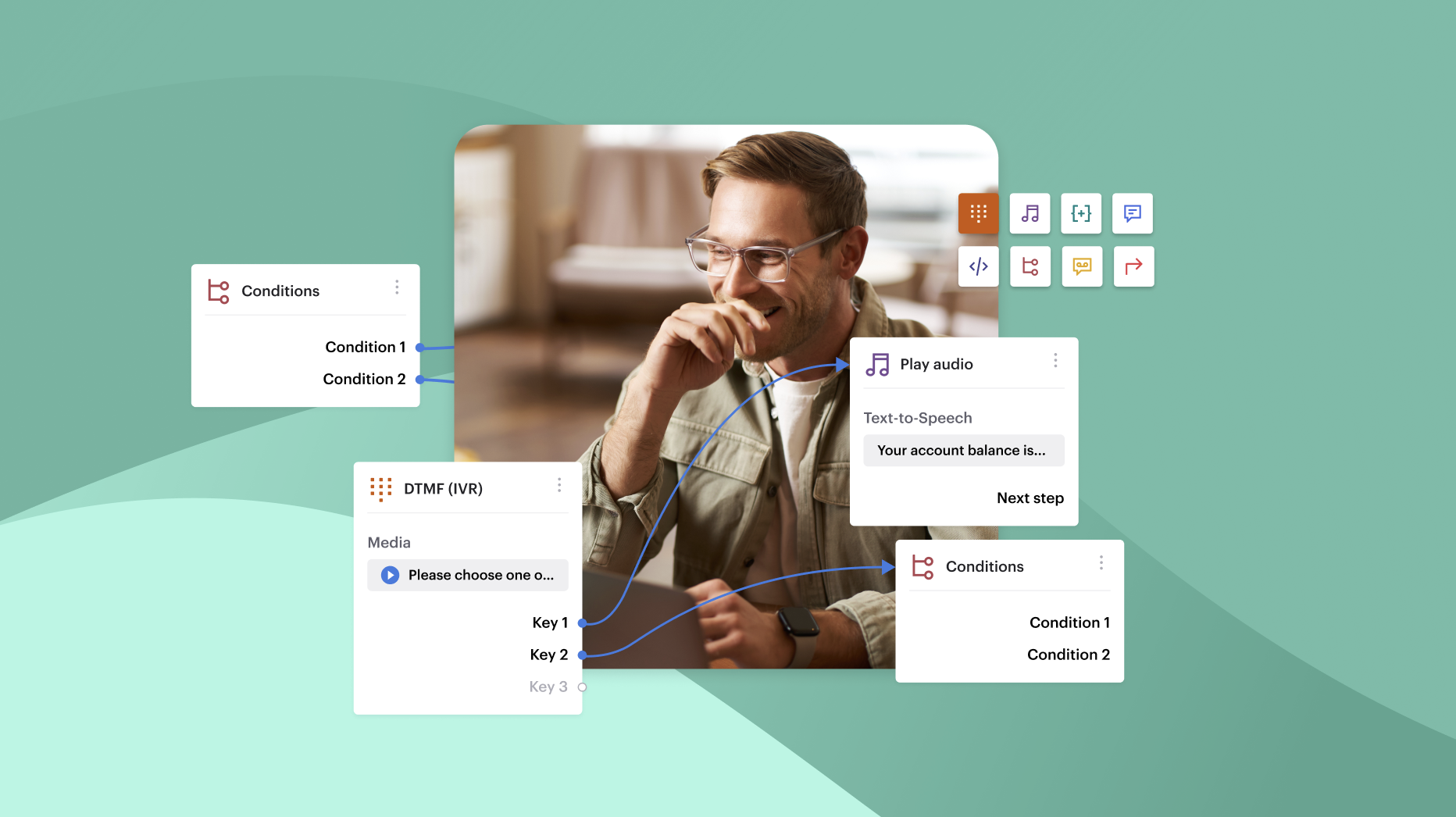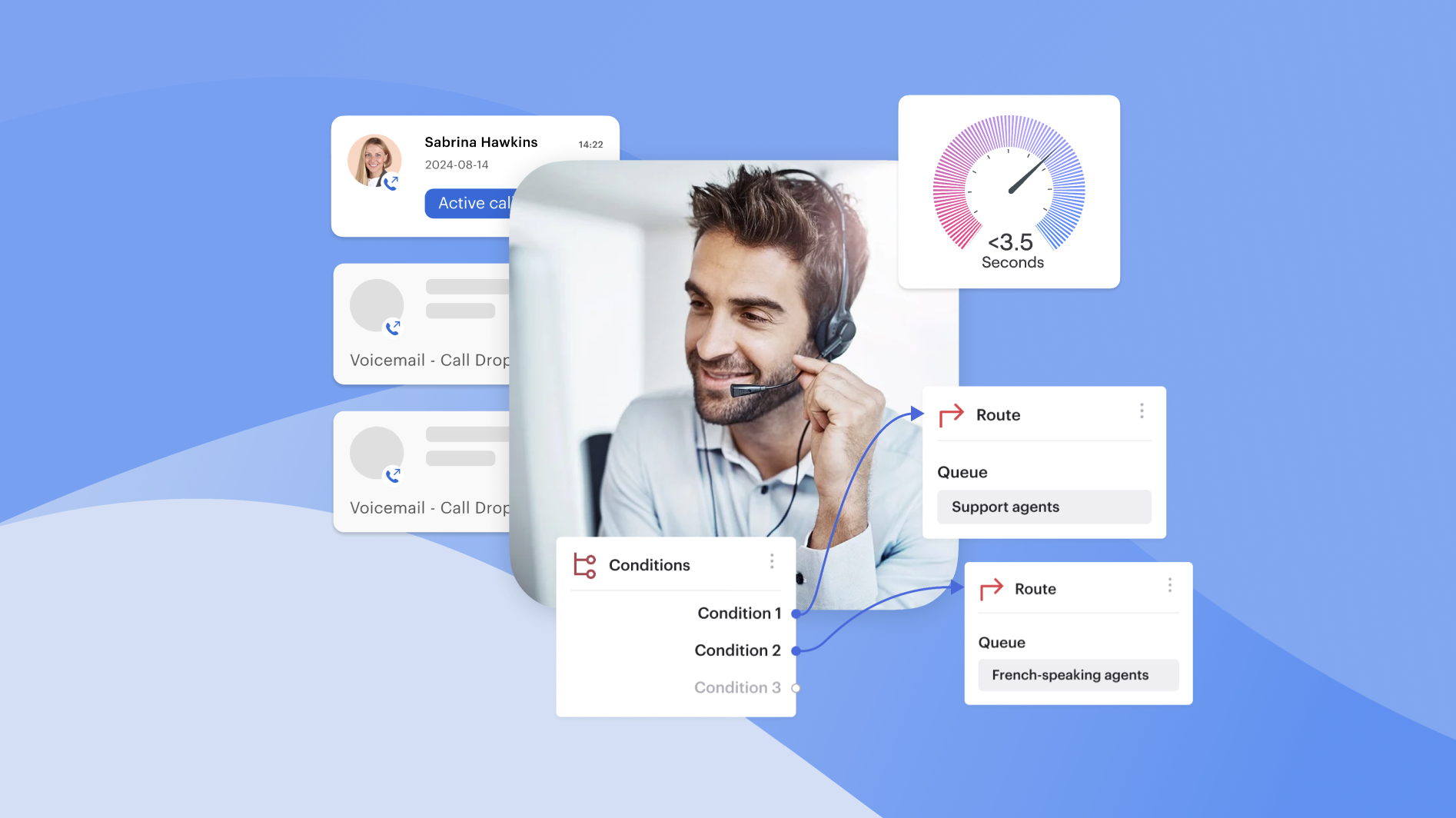Call centers are under constant pressure to deliver top-tier customer service with very little room for error.
Enter AI-driven call center software. It’s revolutionizing the call center industry and speeding up issue resolution by 92%, making it easier for human agents to perform at their best.
Let’s take a look at exactly how it’s transforming call center operations.
Takeaways
- AI-driven call centers streamline operations, automate routine tasks, and support human agents to improve efficiency, scalability, and customer satisfaction.
- Benefits include faster issue resolution, reduced operational costs, standardized service, increased accuracy, and 24/7 multilingual support.
- Key AI features include chatbots and virtual assistants, predictive call routing, speech recognition and analytics, IVR, predictive dialers, reporting dashboards, and omnichannel toolkits.
- Real-time data and analytics empower managers to monitor KPIs, optimize agent performance, and deliver personalized customer experiences at scale.
- Choosing the right software requires evaluating features, integrations with CRM and other tools, scalability for high call volumes, and reliable support and training from the vendor.
- AI enhances security through voice biometrics, anomaly detection, and data encryption, ensuring compliance and safeguarding customer information.
- Adopting AI in call centers enables data-driven decision-making, operational efficiency, improved customer experience, and competitive advantage in 2026 and beyond.
What is an AI Call Center?
Almost everyone has interacted with customer service at some point, so we all understand the frustration of waiting on hold or being bounced around between various departments.
An AI-driven call center replaces the traditional method: it leverages artificial intelligence to streamline every aspect of customer service operations. It can manage tasks, interactions and large call volumes, in addition to easily handling routine inquiries that don’t require a human touch.
AI can even implement machine learning to mimic human-like speech. Plus, it uses real-time data analysis to support human agents. The possibilities are endless—and bring numerous benefits to call centers that improve both efficiency and CX. Let’s see how.
Benefits of Using AI-Powered Call Center Software
#1 Customer Satisfaction
Thanks to Interactive Voice Response (IVR) coupled with Text-to-Speech (TTS) technology, AI can handle thousands of everyday questions like FAQs and account queries. It directs the customer to the right department through self-service menu options, cutting down on wait times and enabling quick, accurate resolutions.
AI can also gather information from the customer such as account details and reason for calling. With the relevant customer data ready to go, any interactions with agents are significantly more efficient, leading to better overall customer satisfaction.
#2 Reduced Costs
It goes without saying that having a large team is costly: salaries, recruitment, training, onboarding and overtime all eat into the balance sheet. And for companies with a global presence, having 24/7 support agents can be a huge financial drain.
AI doesn’t have limitations like we do. It can work 24/7 with no breaks, no matter the customer’s country. Plus, it can adapt to almost any language, so hiring multilingual agents to handle cross-border communication can be a thing of the past. What’s more, maintaining software is a lot cheaper than maintaining human staff; which means less need for large teams and lower overall costs.
#3. Scalable Operations
Scaling operations in line with rapid growth is no easy feat. And for companies expanding internationally, adapting strategies by country gets messy. Thankfully, AI can support multiple languages, making it much easier for companies to serve a global customer base.
No matter the volume of calls, whether during peak hours or product launches, AI efficiently handles things without the need for additional staff.
#4. Increased Efficiency & Productivity
Many call center interactions involve repetitive tasks like data entry and customer authentication, all of which take up a significant portion of the agents’ time. AI automates the handling of these inquiries, freeing up human agents to apply their creativity and problem-solving skills to more valuable tasks.
#5. Improved Accuracy And Consistency
Having a large team of agents increases the risk of human error, as well as variations in customer service techniques. AI, on the other hand, standardizes customer service. It ensures that customers are treated the same way, regardless of how they contact the business.
AI provides consistency and reduces the probability of response variations, resulting in fewer errors and more accurate information for customers. It can also continuously monitor interactions for compliance, reducing the risk of violations.
#6. Data Analysis
Real-time analytics regarding customer sentiment, common issues, satisfaction and KPIs enable companies to quickly adjust their strategies based on current data. AI can produce rich insights of trends and patterns in large quantities, allowing companies to allocate resources more efficiently. Decision-making is based on reliable data, which helps businesses hit their targets more consistently.
AI can even use customer data to deliver personalized experiences at scale. By leveraging their preferences and behavior, as well as any past communications, AI can optimize customer satisfaction and improve metrics in the process. KPIs like abandonment rates, call resolution rates and wait times can easily be captured to improve agent performance.
#7. Enhanced Security
Keeping customer data safe is a top priority for all businesses. AI is able to detect any unusual patterns in customer behavior, preventing data safety breaches. Data encryption and secure handling keeps the customer’s information safe during transmission and storage. And voice biometrics can even authenticate callers based on their unique voice patterns.
This reduces the risk of identity theft or unauthorized access, and ensures compliance with data protection regulations.
Key Features of AI Contact Center Software
Intelligent Virtual Assistants and Chatbots
Very simply, a virtual assistant or chatbot is a robot version of a human agent that handles common issues. While humans focus on the complex tasks that require empathy, understanding, and problem solving, AI-driven bots help customers with account queries, password resets and order tracking.
Basically any routine, everyday task that doesn’t require much brainpower, AI can take over.
Chatbots use natural language processing (NLP) to emulate human-like conversation. They learn from their interactions with customers to make future interactions more fluid and natural. And they can handle countless inquiries at the same time, providing instant solutions to a wide range of problems.
Predictive Call Routing
A step up from the traditional routing system that distributes calls based on agent availability, predictive call routing uses an advanced algorithm to analyze a deeper range of factors and route calls more efficiently. Basically, it ensures customers are matched with the best agent to handle their issue, every time.
By taking into account customer history, sentiment, tone of voice and behavioral patterns, as well as agent profiling such as skillet, availability and performance, it can predict which agent is most likely to resolve the customer’s issue successfully; thus increasing the chance of a positive outcome. Resolution time decreases, customer satisfaction increases, and the system gathers insightful customer data for future communication.
Speech Recognition & Analytics
Speech recognition converts spoken word into text, while speech analytics analyzes the conversation. While the customer speaks, the algorithm can identify any keywords or phrases and provide relevant solutions or route the call to the best agent.
Speech analytics also determines the emotional tone of the speaker, identifies common trends in calls that lead to positive or negative outcomes, monitors compliance and agent performance, and highlights keywords to determine product issues or service gaps.
Using both in tandem allows call centers to have better control over their compliance and key metrics, while keeping customer satisfaction at high levels.
IVR
Interactive Voice Response technology helps businesses implement intuitive self-service menu options. It involves pre-recorded messages that allow the customer to choose from a variety of options to route them to the right department. It collects information from the customer like account numbers, reason for calling, names and any other relevant information, and feeds it to the agent once the call is connected.
IVR is invaluable to call centers dealing with high call volumes as it can handle the data collection part of the call, leaving the agent to work solely on problem solving.
Predictive Dialer
AI-predictive dialers can automatically make calls in bulk from either a simple CSV file, or by pulling contacts directly from the CRM. With analysis of agent availability and call trends, it can predict when an agent will be free to handle the next call. Thanks to this improved timing and accuracy, calls are only connected to live customers, which boosts connection rates dramatically.
It’s easily adaptable to real-time data, too: Predictive dialers can adjust the rate of dialing depending on how many agents are available and the probability of reaching a live person. This minimizes downtime and ensures that agents talk to actual customers rather than waiting around for phones to ring.
Reporting Dashboards
Reporting dashboards have the power to bring together both real-time and historical data to enhance decision making efficiency. They provide managers and agents with a comprehensive view of all KPIs, as well as insights into customer calls and agent performance.
They’re also able to analyze huge amounts of data at once, which is helpful for generating reports, tracking trends, flagging issues and even forecasting customer behavior or higher call volumes. It makes it easy for managers to spot problems or any areas for improvement.
Omnichannel Toolkit
Every customer is different, which means the communication channels they use to reach out to businesses can vary hugely. Omnichannel capabilities make it easy for call centers to interact with customers, no matter the medium they use to connect. Whether SMS, email, phone call, social media or third-party messaging apps, Omnichannel communication
brings them all together in one interface. For an agent, this means being able to easily switch between WhatsApp, email, voice call or SMS, without leaving the customer on hold.
Choosing the Best AI Software for Your Call Center
Understanding AI call center software is half the battle. Choosing the right one to suit your specific business needs can determine the effectiveness of your call center, both now and in the future. Consider a few different factors before embarking on your journey:
Features
The features you need for your business will differ depending on your business needs. And every software is different. When assessing your options, be on the lookout for:
- AI-powered chatbots to handle the simple, repetitive tasks like FAQs and account queries.
- Speech recognition and analytics that enhance customer interactions with tone, sentiment and outcome identification.
- Real-time insights that analyze call context to provide prompts and assistance to agents during calls.
- Predictive call routing that sends customers to the best agents for their issues, improving both resolution times and customer satisfaction.
Integrations
Implementing a call center software should solve problems, not create them. Making sure it smoothly integrates with all existing systems is a key consideration in choosing a solution. The new system should easily connect with:
- Customer Relationship Management (CRM) systems for smooth information flow and readily available customer data.
- Third-party tools such as email marketing softwares and social media management platforms for thorough tracking.
- VoIP systems to ensure efficient call handling and better monitoring.
- Help desk platforms or ticketing systems to prevent issues in case management and customer support requests.
Scalability
Your chosen software shouldn’t just integrate well with your business; it should grow and scale alongside it. Whether your call center is expanding to new markets or growing its workforce, it should be able to:
- Support customers with multilingual capabilities, no matter their time zone or region.
- Handle high call volumes with ease.
- Be available 24/7 and provide automated service round the clock.
- Route calls with AI to support live agents and manage workflows.
Support
When choosing your software, making sure the provider has effective and responsive support is imperative. When making your choice, consider:
- Training resources provided, such as webinars or live demos that ensure your team fully understands the software and its use.
- Account managers that help the whole team optimize the tool’s performance with personalized support.
- 24/7 technical support in case of outages or system issues that could damage performance.
- Monitoring and maintenance to keep track of system stability and constant updating of features and security.
A Final Thought
The future of AI in call centers is unlimited. It’s completely changing the game for data-driven decision making and customer satisfaction. Features like chatbots, speech analytics, predictive call routing and real-time reporting enable businesses to scale effortlessly.
They can improve efficiency and agent performance and reduce costs across the board.
Making sure to choose the right software for your business involves careful consideration of key features that fit the business needs. But embracing AI as part of your call center ensures you’ll be one step ahead of the competition.
Talk to us today to see how Voiso can revolutionize your call center with AI-driven technology.





